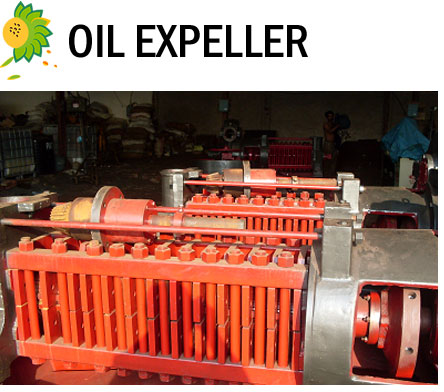 |
| |
BIODIESEL is a clean burning, Eco-Friendly natural fuel obtained from TREE BORN OILS by a Chemical transformation process called TRANSESTERIFICATION carried out in a Chemical Processing Plant. Transesterfication is an age old chemical process and is a time tested method of Transforming Vegetable oils or fats into Biodiesel (Alkyl Esters of Fatty acids) and Glycerine plus some soaps etc.
The chemistry lies in transforming the Fatty acid chains into Alkyl Esters of respective fatty acids present in different feed oils used and isolation of glycerol present in the Triglyceride molecule in the oils and fats.
Industrial production of Biodiesel consists of the following THREE distinct processing phases and three basic Equipment line ups. |
| |
Oil Expeller At Our Factory Shed In Domjur, Howrah |
 |
| |
Processing/Expulsion of oil from oil seeds such as: |
|
| a. Jatropha Curcas |
b. Pongamia Pinnata |
| c. Madhucha |
d. Rice Bran Oil |
| e. Neem Oil |
f. Rubber Seed Oil |
| g. Sal Seed Oil |
h. Palm Oil |
| i. Cotton Seed Oil |
j. Rape Seed Oil |
| k. Sunflower Oil |
l. Soyabean Oil |
| m. Castor Oil |
n. Used Vegetable Oil |
| o. Fish Oil |
p. Animal Fats/Tallows |
|
|
Many other edible and non edible oils available in the Indian subcontinent and across the globe are also used as feed stock for Biodiesel.
Edible oilseeds ruled the roost for centuries and were cultivated for global consumption and trade. Non edible oils were mostly wildly grown or cultivated in very nominal quantities for other purposes.
With the beginning of the Biodiesel era, there is a tremendous thrust all over the globe in cultivating Non edible oil seeds particularly JATROPHA CURCAS which has been identified as the most commercially viable oil seed for Biodiesel Industry. Jatropha is a plant of TROPICS and hence tropical countries like India and Africa with huge land mass emerged as the green field for Jatropha, Karanj, Madhucha, Sal, Neem and some other Non edible oil seeds and others remain buyers.
Note: In India the demand for Jatropha for the purpose of production of Biodiesel is huge but this demand is not met by the supply of the same as of now, however immense work is going on to meet the demand for Jatropha. Hence Jatropha as a feedstock to produce Biodiesel on a commercial scale is not feasible at the moment in India. This gave rise to a brain wave and the outcome was a unique technology of A MULTI FEEDSTOCK PROCESSING PLANT was conceived and developed by our MD & Chief of Technology. |
| |
| MULTI FEEDSTOCK PROCESSING PLANT |
|
The Competitive Edge which our valued clients are assured of is the simple fact that our processing plants are so designed that they can process a number of easily available raw feedstock (In the Indian Sub-Continent) in to Biodiesel meeting all Global standards.
Hence the equilibrium between the demands for feedstock in order to produce Biodiesel in tune with the plant capacity (viz. 5 MTPD, 10 MTPD, 20 MTPD…..300 MTPD) is economically met and it provides an excellent payback period and therefore a short gestation period for the capital expenditure for our valued clients. |
|
| The Equipments required to expel the full quantity of oil are: |
 |
Oil Expellers |
 |
Solvent Extraction Plant |
| |
Oil Purification – Degumming & refining: |
|
| This process requires Physical & Chemical Refining machineries. Biodiesel can only be produced from RBD (Refined, bleached & degummed oils). |
| |
Transesterification Reactors & Processors: |
|
| Transesterfication is a chemical process by which the triglycerides in the oil is separated and the long chain organic acids are converted into their methyl or ethyl esters through a series of reactors, settlers, centrifuge, flash evaporators, neutralisers and dryers to give the end product - Biodiesel. |
| |
Ancillary Storage tanks, Heat Exchangers, Cooling Towers, Thermal oil heaters/ Steam Generators. Gensets etc should be available at site. |
| |